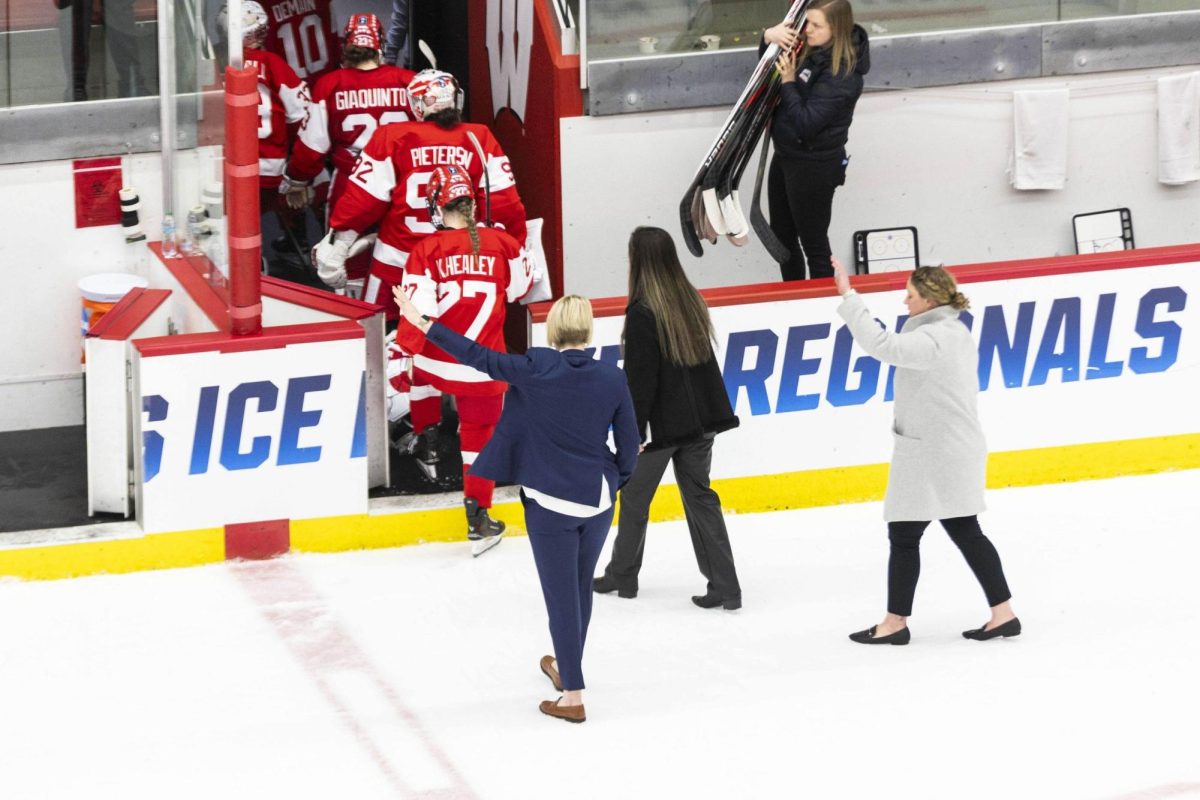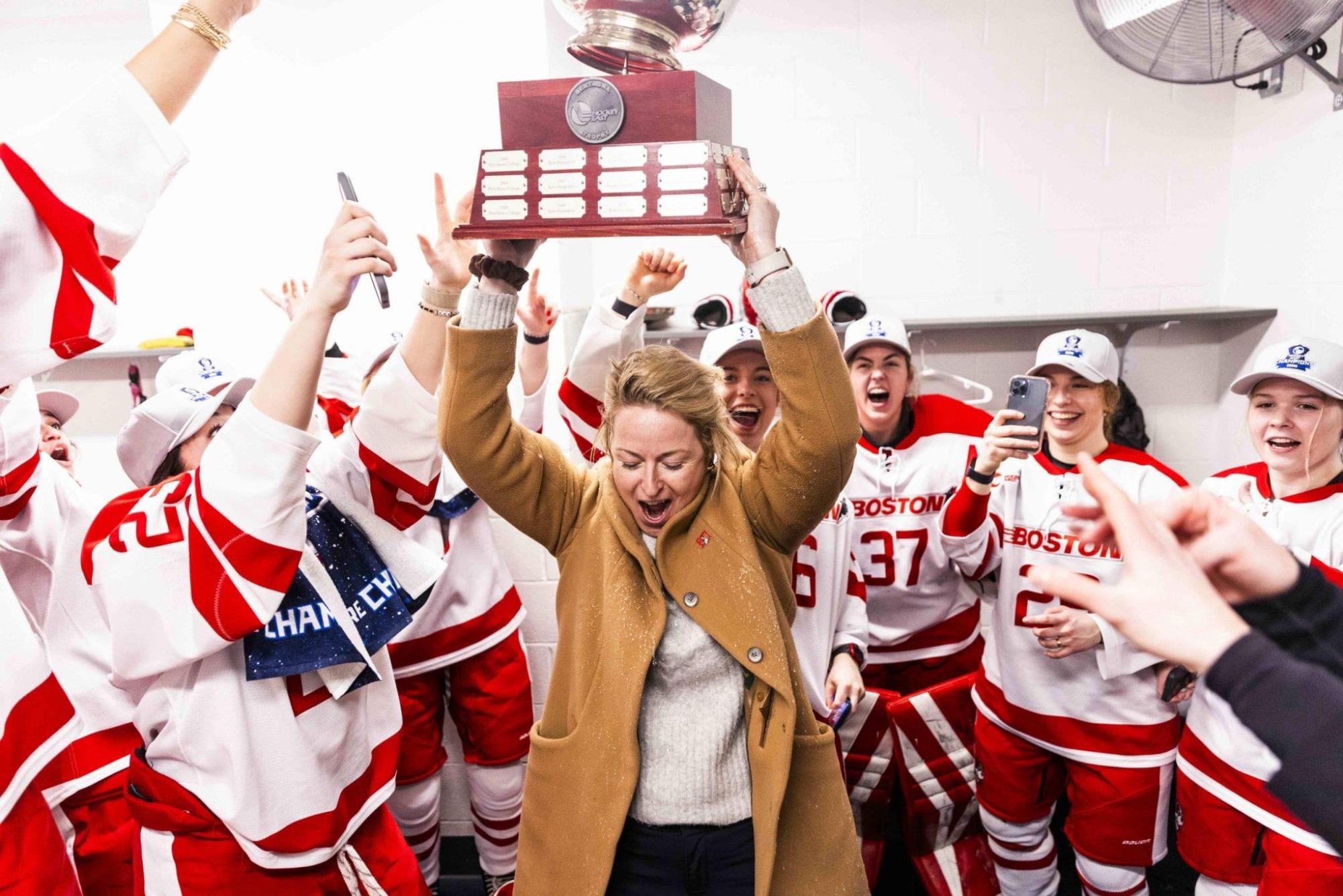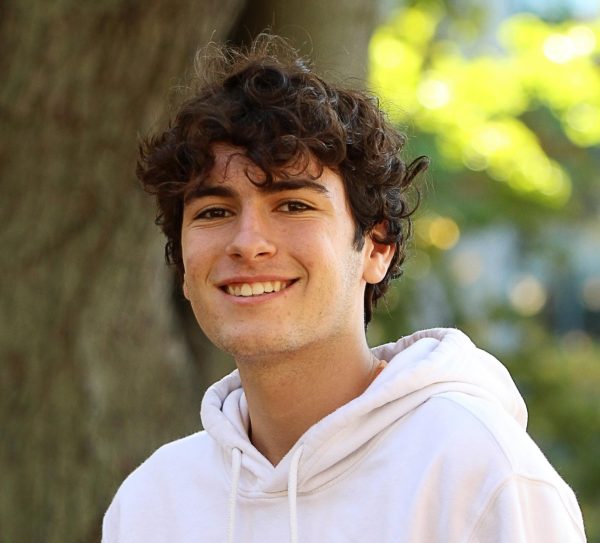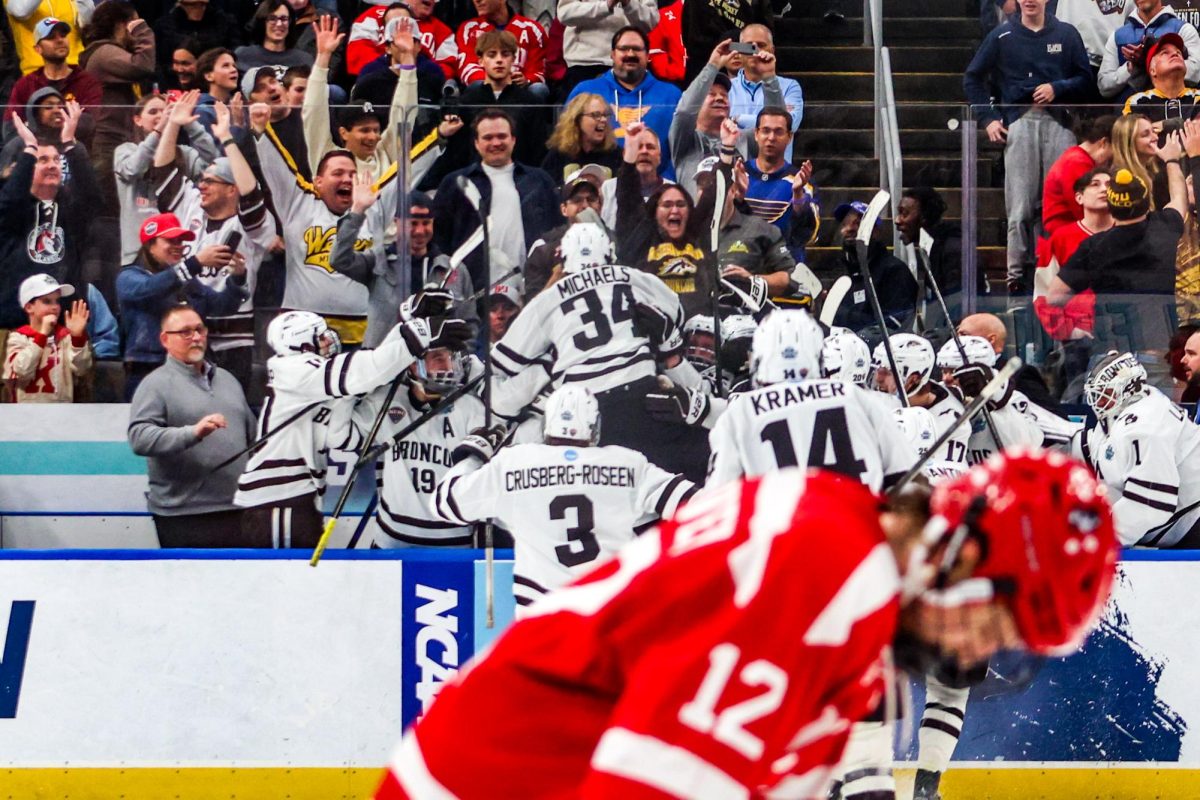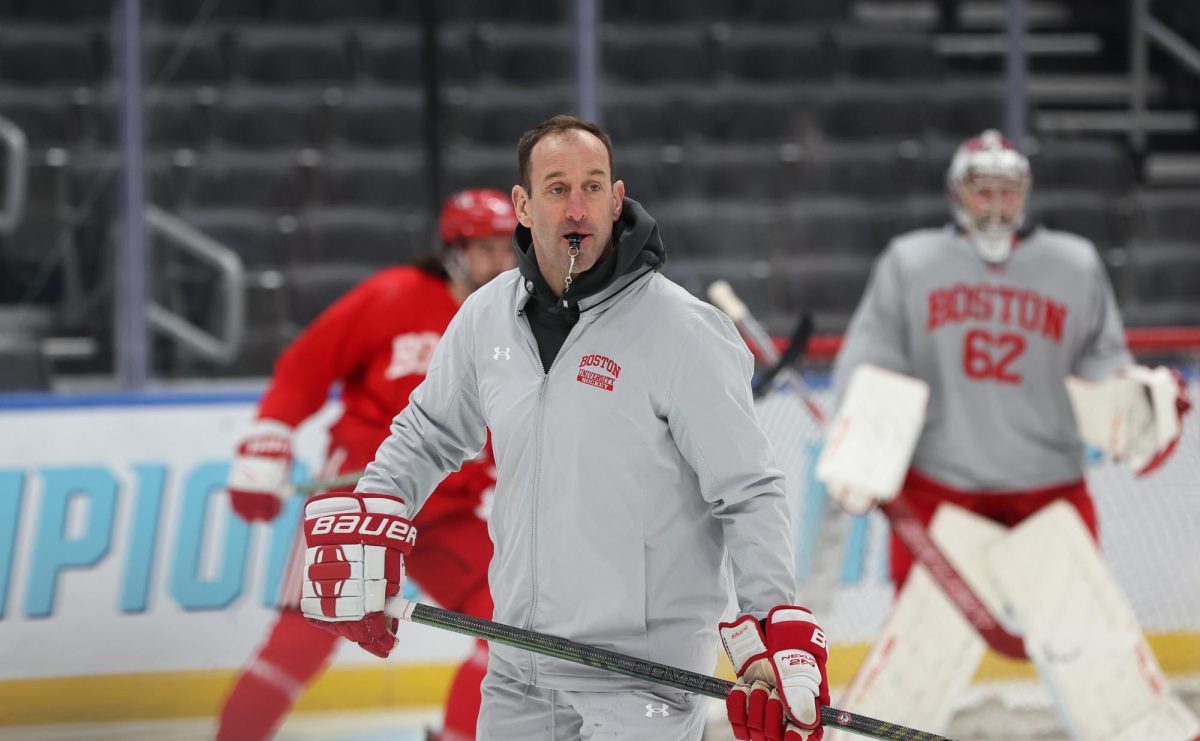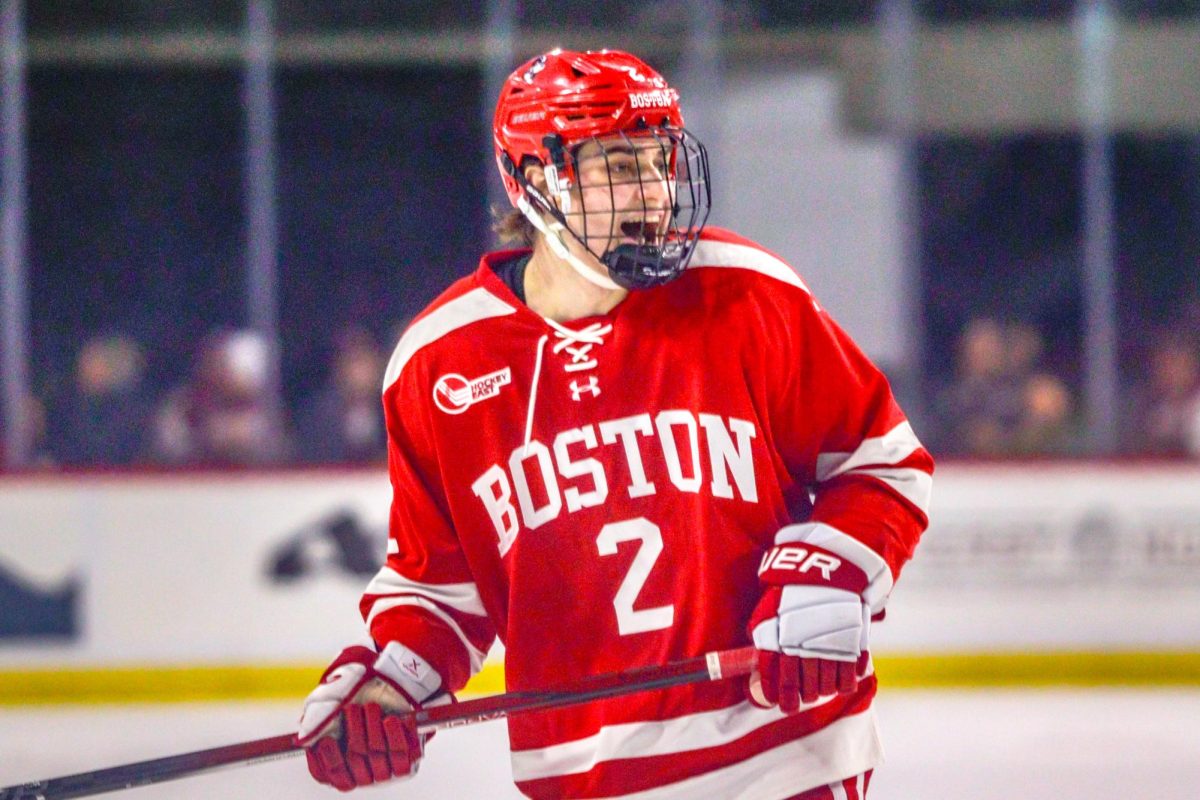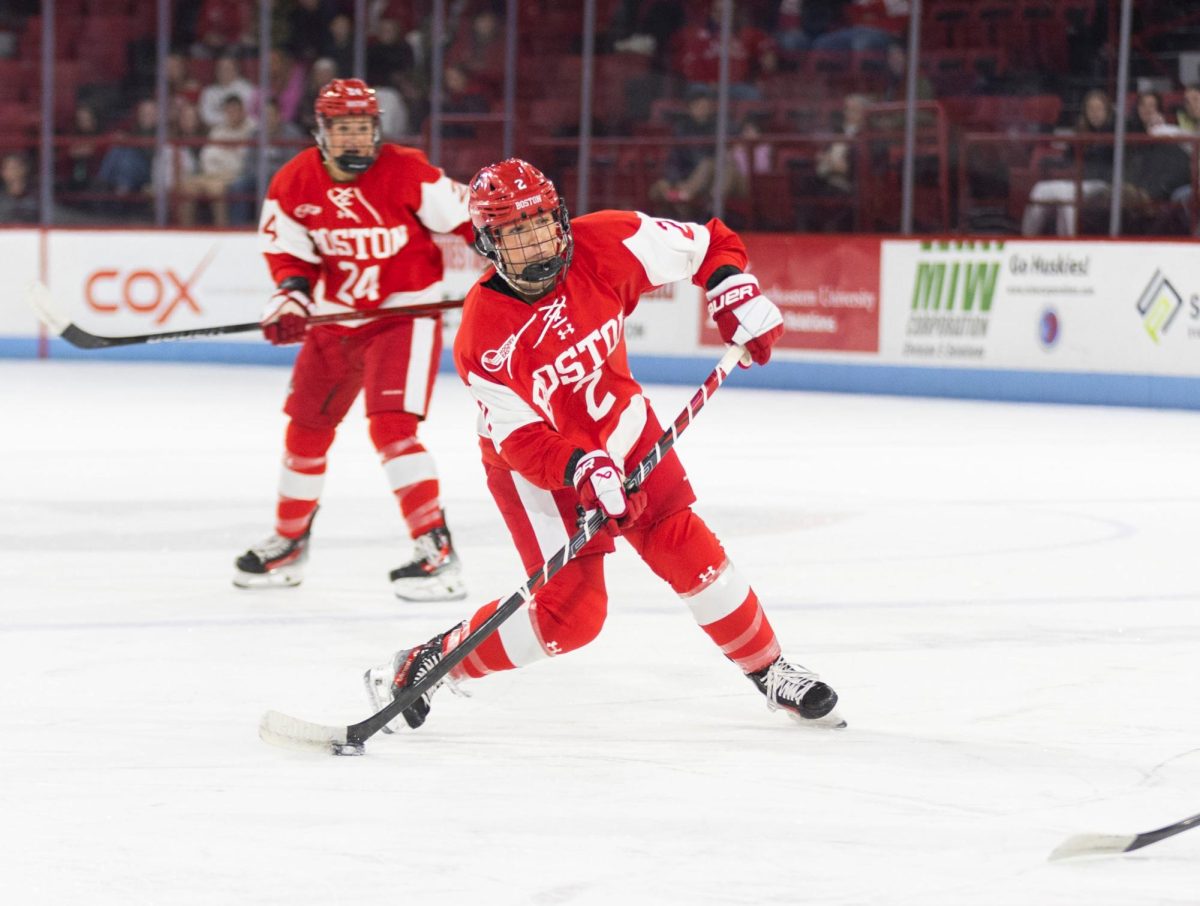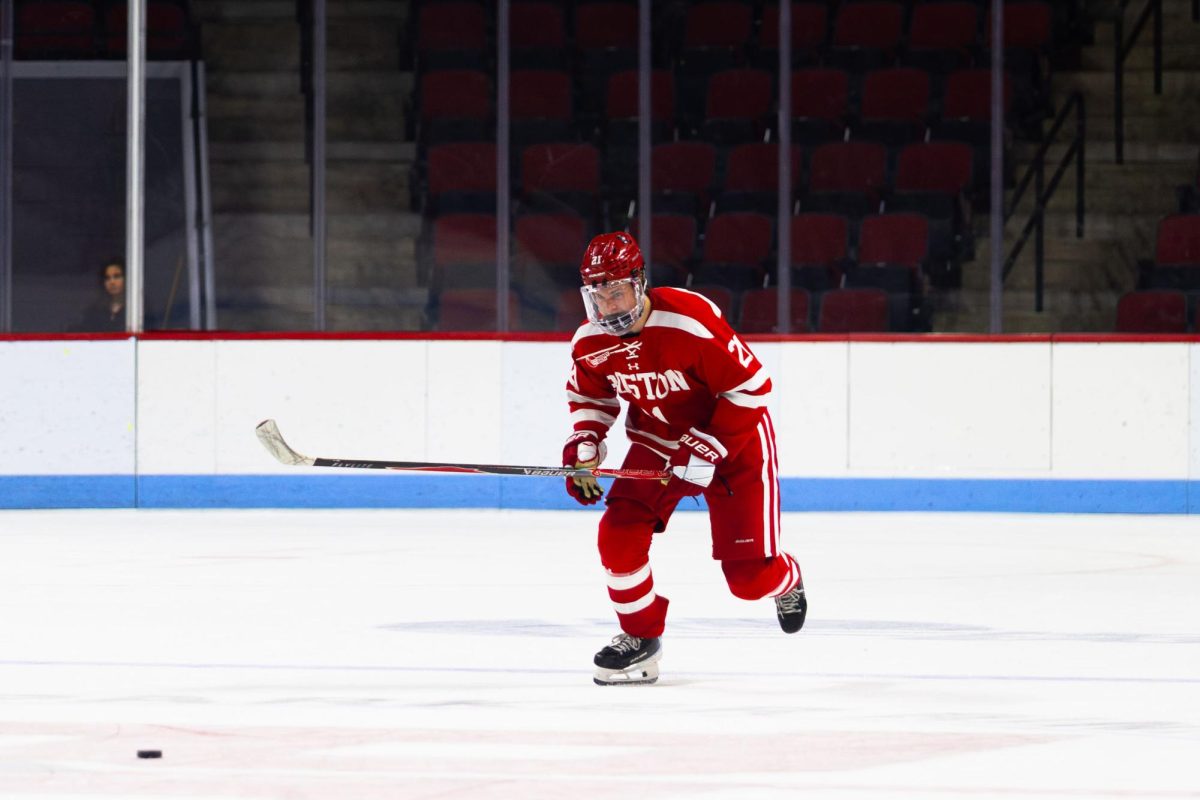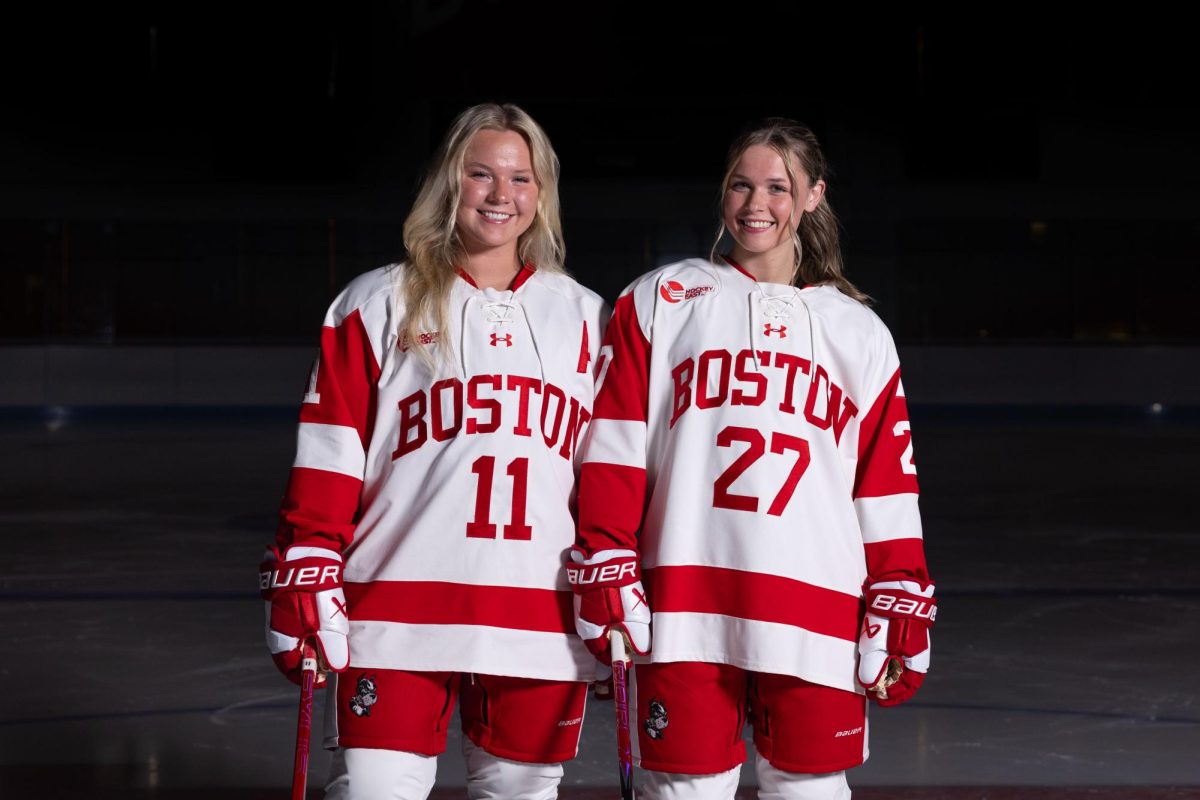THE RECORDER ISN’T EVEN ON. Not yet. Bret Gilmour and I are on a Zoom call. The goaltenders coach of the Boston University women’s hockey team has just finished a hockey clinic, and now he’s in his office, practically chomping at the bit. We’re here to talk about Tara Watchorn.
BU’s head coach, now in the third season of her tenure, has authored one of the most remarkable, against-the-odds turnarounds in college hockey. When she returned to her alma mater in April 2023, BU was reeling. Two straight losing seasons. No playoff wins in four years. A group of players that, by then-senior Julia Shaunessy’s own admission, had developed a negative connotation with, well, everything. Now? BU is the defending Hockey East champion. I explain to Gilmour that the whole concept of this story is to figure out how in the world Watchorn pulled that off. I don’t even ask my first question, and he has his answer.
“She is Ted Lasso,” Gilmour says, laughing. “That’s probably one of the best ways to explain it.”
I’d never thought of Watchorn as a Lasso-adjacent figure, even though her time at BU has been defined by winning with a team that no one thought could. Watchorn, it should be noted, is one of the best hockey players in the history of the school and an Olympic gold medalist. When she first returned to BU as an assistant in 2018, her main role was skill development, and she is — without question — a hockey nerd. You can find an hour-long podcast she hosted titled “Strategies for Efficient Line Changes,” a three-minute video of her scribbling on a whiteboard about something called “2-on-2 constraints,” and a 30-minute talk she gave on how to build and sustain momentum within a hockey game. “She has so many things she sees in a practice or a game that would never cross my mind,” says Shaunessy, an assistant captain on the title-winning 2024-25 team. “These tiny little nuances that I’m not thinking about and would never think about.”
So, no, she is not exactly an American college football coach with a mustache who found himself coaching a sport he’d never played. And yet, once you see one way in which Watchorn is similar to Lasso, you’ll never stop finding more. In press conferences, she loves buzzwords and constantly whips out cheesy, made-for-TV one-liners. She is a staunch optimist, who grins — and not sarcastically — at setbacks like an 8-1 loss before Thanksgiving or getting trapped in Vermont an extra night in January. And she is, for lack of a better term, a total goofball. She’s named BU’s power plays and face-off plays after pets, she speaks in a cat voice and she once insisted her assistant coaches join her in penguin onesies for the Terriers’ annual 3-on-3 Halloween tournament, so she could belly-slide across the Walter Brown Area neutral zone like an actual penguin.
And finally, there’s Watchorn’s infectious, unwavering, impossibly resilient energy. “She loves BU. She thinks about BU constantly,” former assistant coach Reagan Rust says. “Like, 24/7.” When Watchorn returned as head coach in 2023, she took over a team that hadn’t had a winning season since before the pandemic and immediately began reminding her players of all the things about BU they should be grateful for.
Sometimes, this positivity drives her players nuts. On the day the Terriers officially returned from Christmas break this past January, she scheduled the dreaded beep test for 8 a.m. “She comes in, she’s so loud, clapping her hands,” Shaunessy remembers. “She’s like, ‘There’s nowhere else I’d rather be, ladies! There’s nowhere else I’d rather be.” The players, of course, could think of a lot of places, but Watchorn didn’t stop the bit. “And all of us are looking at her like, Tara, please spare us,” Shaunessy says. “And she just keeps going, keeps going, keeps going.” Nine months later, Shaunessy can look back and tell me Watchorn’s energy was what got her through the workout.
All of this is goofy. It is not, however, trivial. In fact, it’s the very first thing Watchorn wanted to change when she took over. “Just changing the mentality to be positive,” Shaunessy says. “In whatever we did.” Shaunessy, too, sees the Lasso comparison. She and assistant coach Megan Meyers would laugh about it all the time.
Then there’s Watchorn herself. She’s actually the most lukewarm on the comparison, rejecting the idea of an “overarching” similarity between herself and a TV character. Still, she admits she struggles to get into new shows but also says she’s seen every season of Ted Lasso multiple times. When I ask for her favorite moment in the show, she recalls it vividly. At the very least, Watchorn’s priorities and Lasso’s priorities are aligned. “I’m a hockey nerd. Obviously, or I wouldn’t be in this role,” Watchorn says, sitting on a sofa in her office beneath Walter Brown. “But my passion is really around leadership and group dynamics and creating an environment for our team.” And it is precisely there in which Watchorn engineered BU’s remarkable turnaround. After all, Watchorn won Hockey East with the very same core of players she inherited. This is not a recruiting story. It’s a culture-building story, just like AFC Richmond.
“It wasn’t like we took it from Ted Lasso,” Watchorn says. “But there’s a lot of things that I’m like, ‘Wow, there are similarities.’”
And yes, there is a BELIEVE sign above the front door to her office.
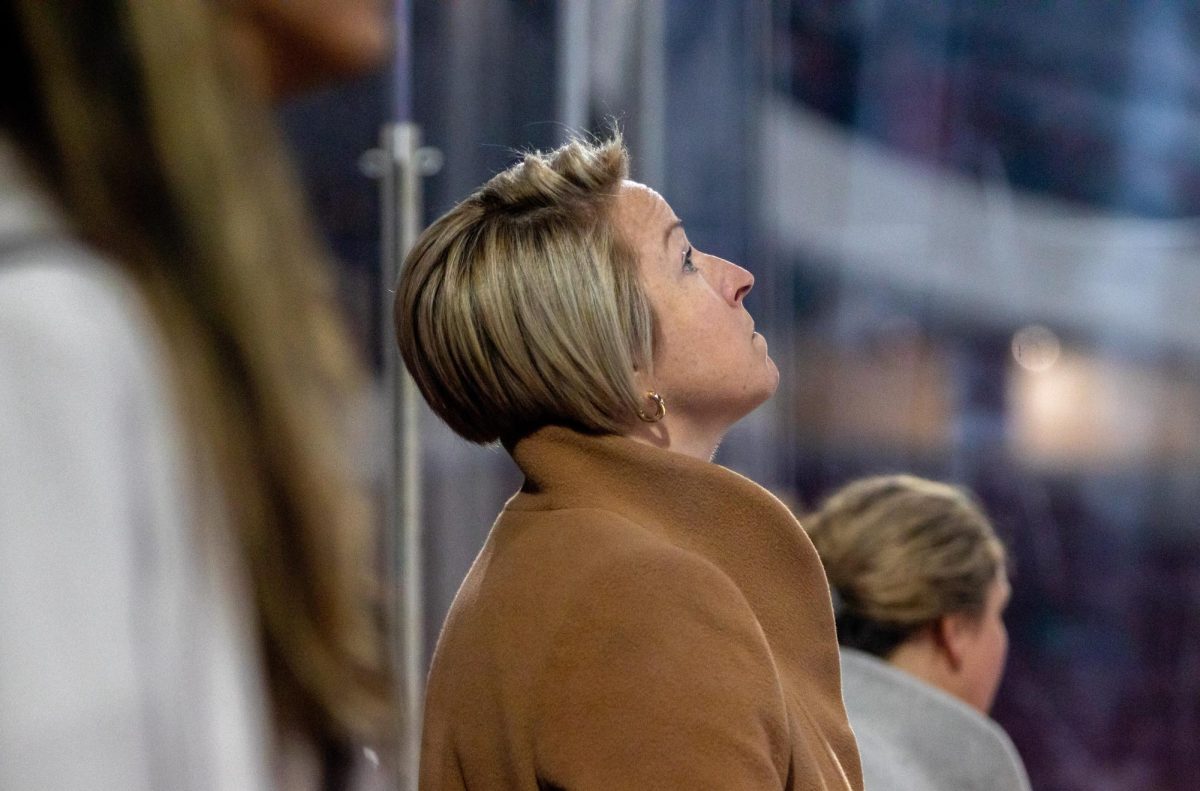
A WELL KNOWN SCENE from Ted Lasso is in Season 1, Episode 3. Trent Crimm, a bewildered journalist spending a day with Lasso and Richmond in the infancy of Lasso’s tenure, found out earlier in the day that Lasso threw a party in the Richmond locker room after a brutal loss. Now, over dinner at an Indian restaurant, Crimm tells Lasso what he’s doing is irresponsible.
Lasso leans in. “I love coaching,” he declares, his tone taking an uncharacteristically hard edge. “And for me, success is not about the wins and losses. It’s about helping these young fellas be the best version of themselves, on and off the field.”
It’s a major cliche, of course, the kind you’d expect in an Apple TV sitcom. The way BU defines success under Watchorn is far more complex, and Watchorn never references this scene in our conversation. Still, Gilmour remembers that after Watchorn’s first season at BU, when the Terriers went just 14-18-3 and lost in the first round of the Hockey East tournament, the head coach didn’t even know the team’s record. Even in meetings with the team this preseason, Gilmour says Watchorn needed a note card to remember BU’s much better record from last year (24-12-2 and a Hockey East title). “That’s how not in tune she is to what the outcomes are,” Gilmour says.
When Watchorn started her tenure in 2023-24, the players she inherited had lost a ton. Shaunessy and the seniors held a 29-41-9 career record, defender Maeve Kelly and the sophomores were 11-20-3 and no one had ever won a playoff game. “I mean, that impacts you after a while,” Shaunessy says. “Three seasons of always getting the short end of the stick.” She admits that players had a negative association with practices and even games, such was the amount of losing they’d done over their BU career. Then Watchorn arrived, with two Hockey East titles and an Olympic gold medal to her name, and decided wins and losses couldn’t be the Terriers’ purpose.
“I’m constantly learning how to build a language around how I define success in this role. Because it goes outside wins and losses,” Watchorn says. “To be able to show up and get the most out of our environment every day, that’s the biggest thing we work towards.”
Watchorn constantly references the Terriers’ “environment.” This is where her adoration for BU comes in — she believes strongly in the resources provided to the program and the unique nature of a school located in a major city at which hockey is the biggest sport. She also reminds her team that playing on a college hockey team is, more than anything, an opportunity. “It gets you in a locker room with women who care just as much as you do about the sport you love,” Watchorn says. The focus, then, is taking that environment and using it to get “curious,” another famous Watchorn buzzword, about how good the team can be. Success is in the curiosity. It’s BU asking itself how far it can go with the environment it has, then going out and finding the answer. Wins are merely a measuring stick.
“They are important. We want to win. It’s a benchmark to see where you’re at,” Watchorn says. “But we can win games that we shouldn’t win. So if you’re only ever content with winning, that’s also a low bar in a lot of ways.”
Watchorn is not tactically pragmatic. In a world in which packing it in defensively and looking to be opportunistic in transition has become a go-to strategy for producing wins — across more sports than just hockey — BU refuses to play the safe game. Its penalty kill is extremely aggressive (at one point last season, Watchorn said BU was always looking for a shorthanded goal). When the Terriers’ defenders are pinned deep in their defensive zone by an opposing forecheck, they’re empowered to make a pass in an attempt to break out instead of eating a hit to protect the puck. And Watchorn is obsessed with what she calls “territorial advantage,” another way of saying she wants BU to have the puck in its offensive zone as much as possible. The Terriers are not just dumping and chasing or waiting for a turnover to kickstart a rush. They’re aggressive by nature.
“She’s never going to hold a mistake over your head,” Kelly says of Watchorn. “And that fosters such a great environment. Because we can be competitive, we can try new things, without fear of messing up.”
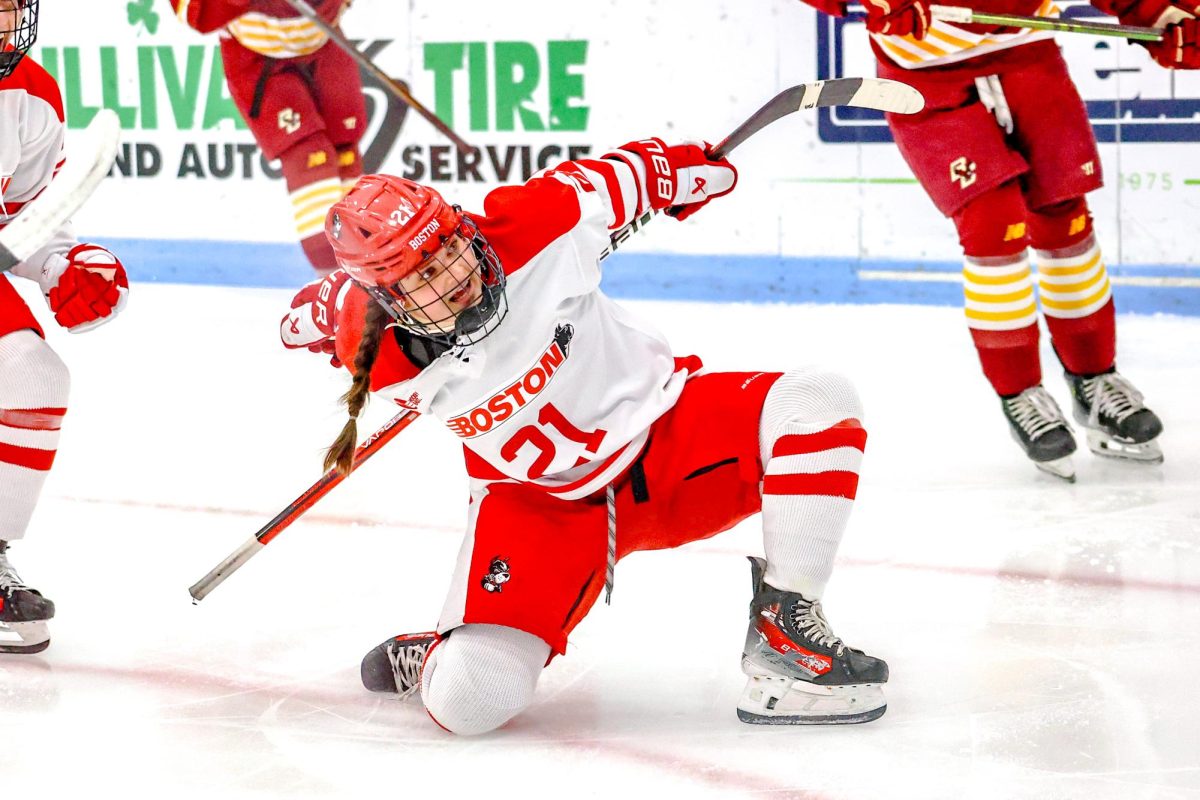
HERE’S A TED LASSO MOMENT Watchorn herself did reference: Season 3, Episode 6. “Sunflowers.” Richmond is in Amsterdam, and after a brutal loss to Dutch club Ajax, Lasso announces to the players that there is no curfew for the night. This episode is packed with subplots, but the one we’re focused on concerns what the players do with their freedom. Plenty of suggestions are thrown around, but captain Isaac McAdoo stops the group. Not until they arrive at a full consensus, he says, are they doing anything. The night eventually ends with an enormous pillow fight in the hotel lobby.
“And it’s something stupid. It’s not soccer,” Watchorn says. “But it shows the players starting to take ownership over their team.”
She says only that she “maybe subconsciously” took this from Lasso. But one of the foundations of BU’s culture during its Hockey East title run was exactly this — Watchorn letting her players lead the way. The Terriers’ staff was purposely hands-off in 2024-25. During intermissions, Shaunessy says the coaches would only enter the locker room with around two minutes to go. During the week, she says BU’s captains had a mandatory meeting with coaches, but that was mostly to discuss logistics. Debriefs after practices were given fully to the players; only when the players needed advice on how to debrief did they go to Watchorn and her staff, according to Shaunessy.
“At the end of the day, they’re not going to be bought into anything that’s not theirs,” Watchorn says. “I realized I can’t just paint this vision and talk about it and expect they’re all going to walk towards the light with me.”
This isn’t to say Watchorn wasn’t doing anything. She describes her role as if she were running a kind of test, in which she’d purposely stress different parts of her players’ culture to force them to solve problems together. She calls these “accountability systems,” and she makes it sound as if she was setting the rules, then walking away and letting her players figure out how to hold each other to them. “I equate it to a mini game in practice,” Watchorn says. “You change different rules around a mini game to get a different rule or concept out of it. I’ve learned that by doing that with our environment, now they’re feeling what I want them to feel.”
One moment in which BU’s culture was tested last year was around November. Watchorn went to Calgary, Alberta to visit Carly Warren, a close friend and former teammate at BU who now works as a psychologist. Warren says Watchorn explained to her that there were a couple players who were operating with a poor attitude. Watchorn didn’t punish the two players or push them off to the side, Warren says. She actually gave them more responsibilities within the team’s culture, in an effort to provide them a greater identity and breed a sense of accountability.
“Back in the day it would’ve been like, ‘Hey, you two sit on the sidelines and watch your team,’” Warren says. “So she’s really cognizant not to, because that exposes people in a way that just pushes stuff underground. It doesn’t actually hold up a mirror to really promote growth or development in the area you’re trying to address.”
The players became so comfortable running their own ship that by the culmination of the 2024-25 campaign — between the end of the regular season and the start of the Hockey East tournament — they took even more control. BU was just swept in its final regular-season series against UConn, a pair of losses that cost it the No. 1 seed. The Terriers now had to regroup for the playoffs, in which their season would effectively be one loss away from ending. Understandably, there was some urgency amongst the coaches to get the train back on the tracks. “That week, we’re in there trying to triage everything as coaches and get everything going,” Gilmour recalls. “And our captains took the room. They’re like, ‘Hey, we’re gonna run the meetings.’”
“I don’t know too many coaches that let players start running pregame meetings,” he adds. “Especially that late.”
It worked, of course.
“She was talking to me about the girls and telling me the dynamics of her team and what she’s done to support them and what she’s done to hold them accountable,” Warren says. “I’m a psychologist… and her pulse on that is so accurate.”
But Watchorn loves more about that moment in Ted Lasso than just the players taking over. Because “Sunflowers” is ultimately an episode about Lasso. He spends most of it sitting in a bar — alone, without anyone else to worry about — and winds up discovering one of the most famed and successful tactical strategies in soccer using ketchup and mustard containers. “He finally actually thought about [soccer],” Watchorn explains. Therein lies the selfish benefit to Watchorn giving her players the keys to the team. “If you guys can handle that amongst yourselves and keep each other accountable, we can coach,” Gilmour says. “Then I can do the Xs and Os.”
And that’s the thing about Watchorn. I’ve spent 2,541 words telling you what makes her such a good coach, and I’ve barely even mentioned that, oh by the way, she’s one of the most accomplished hockey players of her generation.
She’s Ted Lasso if Ted Lasso actually knew the sport he was coaching.
“Her knowledge of the game, too, is unbelievable,” Rust says. “One of the smartest coaches I’ve ever met.”
